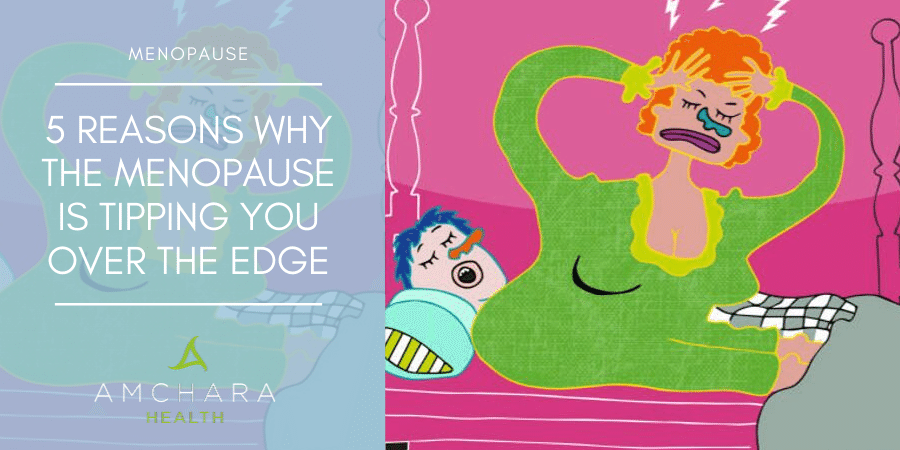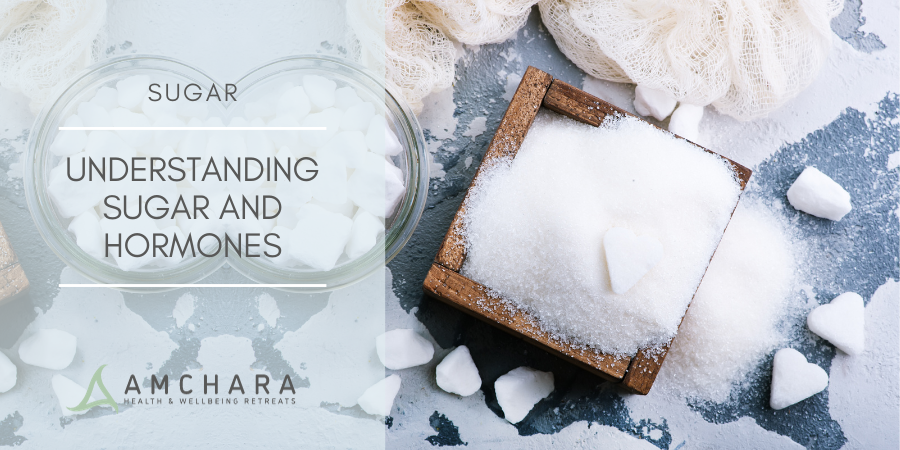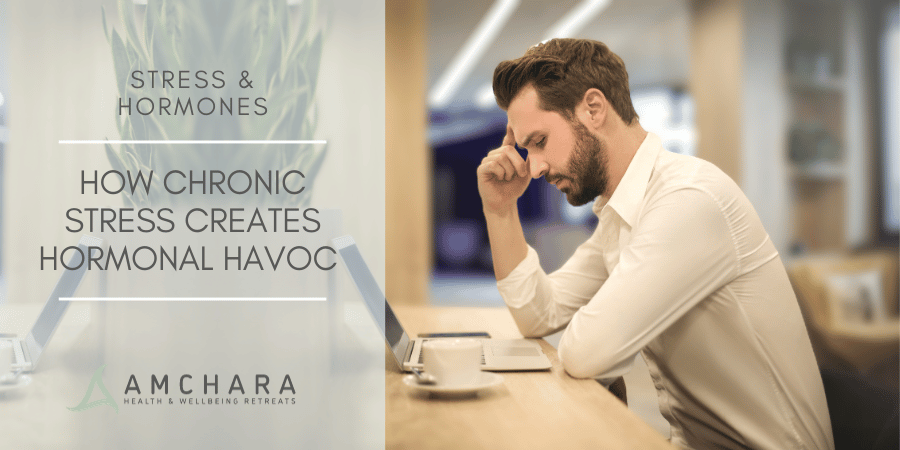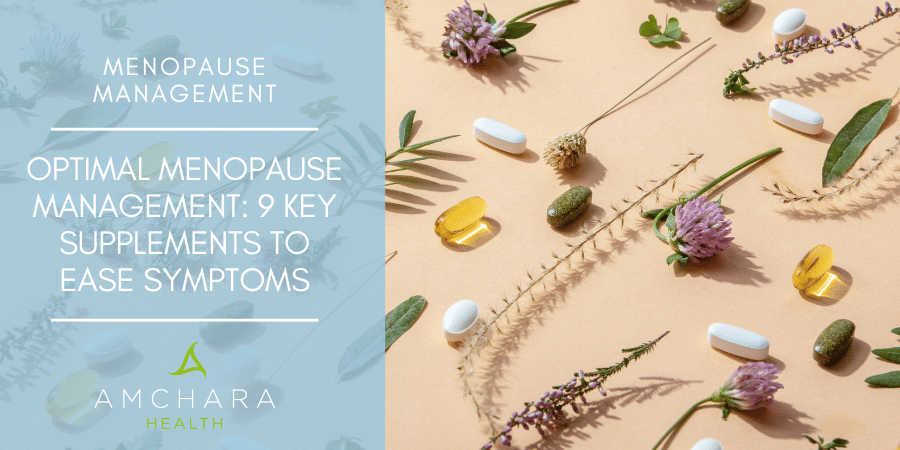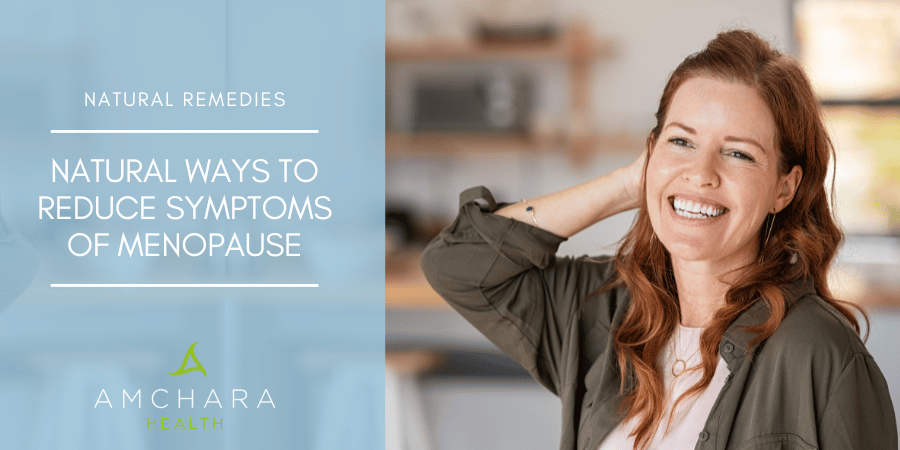Five typical symptoms of the menopause that can make life difficult are hot flushes, night sweats, depression, low sex drive and fatigue.
We always take an evidence-based approach and aim to provide you with actionable knowledge and tips to help you on your journey to optimal health.
In this article we’ll take a closer look at what actionable steps you can take to manage these menopause symptoms.
Quick Index:
How to Manage 5 Typical Menopause Symptoms
The menopause is defined as the cessation of menstruation due to the loss of ovarian function.
It typically happens between the ages of 45 and 55, however, for some women, it can start as early as the mid-thirties.
The lead up to the menopause – termed the perimenopause – can start any time from one to ten years before the menopause. This is a time when hormonal changes produce symptoms that vary in severity.
Changes in the menstrual cycle which occur during the perimenopause are due to alterations in the levels of the key sex hormones, particularly oestrogens.
These changes have a direct effect on the body, especially tissues where there is an abundance of hormone receptors, such as breast tissue, skin, fat, bone, bowel, brain, liver, cardiovascular, uterus, urinary tract and vaginal tissue.
Some women experience very few symptoms but for some it may be more of a challenge to navigate.
Whilst we cannot completely control our hormones, it is possible to alleviate and, in some cases, avoid difficult symptoms.
1. Hot Flushes
Erratic fluctuations in hormone levels may cause disturbances in the temperature control area of the brain, leading to hot flushes and night sweats.
This is thought to be caused by dilation of the peripheral blood vessels.
It is not entirely clear what exactly underlies this, but it may be caused by a reduction in oestrogen or an increase in FSH (follicle stimulating hormone).
It has also been suggested that prior to the menopause oestrogen keeps the blood vessels toned, preventing excessive vasodilation.
Plant oestrogens, known as phytoestrogens, found in plants and herbs, gently mimic natural oestrogen and can help to balance out the hormones, thus reducing symptoms such as hot flushes.
Phytoestrogens are adaptogens which means they can contribute to normalising levels of oestrogen.
They are thought to interact with human oestrogen receptors, helping to modify the effects of insufficient or excess oestrogen in the body, bringing it more into balance and providing relief from menopausal symptoms.
Japanese women, whose diets are rich in phytoestrogens because of the high vegetable and fermented soy content, have far fewer problems at the time of the menopause than Western women. In fact, epidemiological evidence suggests phytoestrogens offer a beneficial role in the menopause by reducing hot flushes and night sweats.
One serving of vegetables contains at least 100 different phytochemicals but you need a healthy gut flora in order to metabolise phytoestrogens effectively.
Natural Remedies
-
Supplement with vitamin E (500mg/d) and vitamin C (500mg/d) – both aid blood vessel tone and health.
-
Alternatively increase foods containing Vitamin E (wheat germ oil, soybean oil, almonds, walnuts, sweet potato) and foods containing Vitamin C: Brussel sprouts, red and green peppers, blackcurrants, guava, kiwi and broccoli.
-
Include phytoestrogen-rich foods such as fermented soy-based products (miso, natto and tamari), as well as linseeds, the herb red clover, alfalfa, ginseng, celery, fennel, anise, liquorice, rhubarb and other green and yellow vegetables. An Italian study published in the Journal of Obstetrics and Gynaecology suggests that eating fermented sources of soya can help to reduce the frequency of hot flushes.
-
Try Black Cohosh – this is an herb that is routinely used to help with menopausal symptoms and has been studied extensively. It appears to be one of the most effective botanicals for the relief of vasomotor (VSM) symptoms and is thought to work on the pituitary gland to suppress the secretion of LH (luteinising hormone). High levels of LH are associated with menopausal symptoms, especially hot flushes. You need to take 80-160mg/d of black Cohosh to produce significant changes.
-
Reduce stimulants such as coffee, alcohol and spicy foods which can trigger hot flushes.
-
Add a tablespoon of powdered flax seeds to your breakfast cereal or smoothie. This will give you a good daily amount of soluble fibre, which helps to increase healthy gut flora and is also a rich source of phytoestrogens
-
Soak in a lukewarm bath for 20 minutes each morning, some women find this prevents hot flushes all day long!
-
Stress and anxiety has not only been shown to increase the number of hot flushes at the menopause but can also make the transition through this phase in a women’s life more challenging. Try to spend at least 20 minutes every day relaxing. Learn how to meditate or practice deep breathing relaxation exercises once or twice a day.
2. Night sweats and lack of sleep
One of the symptoms found to most significantly affect the quality of life during the menopause is lack of sleep.
Constantly waking in the night sweating is a common complaint for many women approaching, and during, the menopause.
Night sweats are basically hot flushes that are accompanied by heavy perspiration during sleep, which cause disrupted sleep. These vasomotor symptoms are the menopausal symptoms for which women seek treatment most often.
VMS is believed to be the result of dysfunctional temperature control which leads to an exaggerated activation of blood vessel dilation and sweating.
Changes in oestrogen levels during the menopause may impact on multiple components that affect temperature maintenance and homeostasis.
Natural Remedies
-
Reduce your intakes of caffeine-containing foods and drinks, such as tea, coffee, fizzy drinks, and chocolate, which will not only exacerbate hot flushes and insomnia but also increase the rate at which calcium is lost from the body and put additional stress on the adrenal glands.
-
It can help to take a small snack before bedtime to ensure that there isn’t a sudden drop in blood sugar levels during the night. This can trigger the release of blood sugar raising hormones that simultaneously increase sweating.
-
Sage is a herb thought to have oestrogenic properties that reduce night sweats and is best taken as a cold tea. Try chopping 6 fresh sage leaves and soaking overnight in lemon juice. In the morning strain and drink the juice which is also thought to reduce blood sugar levels. 7-10 days of this mixture may help to control flushing and sweating and should also improve digestion and concentration. Sage has been found in studies to be effective at reducing night sweats and hot flushes. It is commonly found in menopause formulas
-
Flaxseeds, peanuts and lentils contain chemical compounds called lignans. These plant lignans are the main source of phytoestrogens in the typical western diet. Lignans are acted on by the bacteria in your gut and converted to phytoestrogens, which can help to keep hormones balanced and reduce menopausal symptoms such as night sweats. Flaxseeds are the richest sources of lignans.
-
Include a range of plant foods known for their phytoestrogenic properties. Try Dong Quai, Mexican Yam, Siberian ginseng, and hops. These can be taken orally or applied in creams.
-
Increase your intake of green vegetables as these foods are rich in magnesium. Magnesium is also found in nuts and seeds and whole grains. Magnesium helps to relax the muscles and can help promote restful sleep.
3. Extreme Fatigue
Some women experience fatigue along with stress during this period of their life.
A chronic lack of sleep can be a major factor in poor energy levels.
One of the main causes of menopausal fatigue is the change in hormone levels which work in harmony to regulate cellular energy in the body.
The adrenal glands take over sex hormone production after the menopause and can be compromised due to stress which may exacerbate fatigue.
At this time of life, low thyroid function can also be an issue as well as low iron levels, which may also be a contributing factor in fatigue.
Ongoing fatigue should be looked into by a GP to be sure there are no underlying health issues.
A diet high in simple sugars and refined carbohydrates should be avoided as this can wreak havoc on blood sugar levels.
This has a knock-on effect on hormone balance in the body leading to many of the common symptoms experienced during menopause including low energy levels.
Natural Remedies
Get plenty of sleep – having at least eight to nine hours sleep a night is essential if you want to function well the following day.
-
Make sure your bedroom is dark enough
-
Don’t overstimulate your brain before bedtime by reading, watching TV or using a computer in the 90 minutes before going to bed
-
Although exercise has a positive effect on hormone balance, it’s not helpful to exercise too late at night at this may energise you
-
Try a warm bath before bedtime to promote relaxation
-
Put some lavender oil on your pillow to aid sleep and help you relax
-
Breathe in some energy – Breathing exercises are very effective at clearing your head and raising energy levels.
Close your eyes, breathe in deeply and slowly to the count of 4, and then breathe out slowly to the count of 6. Each exercise will only take 15 seconds, so you can do it several times throughout the day.
-
Try to reduce stress – your adrenal system works hard during the menopause to re-balance hormones so it’s important to avoid overloading the adrenal glands.
Make sure you take time out every day to relax a bit. Try meditation or yoga – both are great for lowering blood pressure and reducing stress.
Supplementing with B vitamins can be helpful at this time as they work together to support the adrenals reducing stress and raising energy levels. B vitamins are also needed to maintain blood sugar balance and regulate hormone function.
-
Drink lots of fluids – dehydration, is a common culprit for fatigue.
Remember that drinks like coffee and alcohol have a dehydrating effect and so water is a much more effective substitute, or experiment with herbal teas and coffee alternatives like Barley cup.
Fruits and vegetables have a high water content and have the added benefit of containing phytochemicals and nutrients that help to keep hormones in balance.
-
Control blood sugar levels as this can cause havoc with your hormone balance.
Simple dietary changes can help to keep your blood sugar balanced throughout the day.
Make sure you eat protein and or fibre with every meal as this slows down the emptying of the stomach.
It also helps to focus on slow-releasing carbohydrates with a serving of healthy fats to ensure a slow drip feed of sugar into the blood, which maintains a steady even blood sugar balance throughout the day.
-
Avoid sugary foods, processed foods, caffeine and alcohol, as these will all raise your blood sugar levels rapidly and create a stress reaction in the body affecting your hormone balance.
The more sugar you eat, the greater the insulin production, which will enhance fat deposition as well as oestrogen storage and production.
Instead of refined, sugary foods, such as white bread, pasta biscuits, crisps and cakes, replace these with whole grains like buckwheat, quinoa, oats, millet, wild & brown rice, vegetables and fruits, and add some good quality protein e.g. lean meat, fish, poultry, eggs, dairy, cottage cheese, nuts, seeds and fermented soya.
-
Use nutritional or herbal support – If you’re low in energy because of stress, give some support to your adrenals.
The herbs Rhodiola, ginseng, astragalus and ashwagandha support the adrenal glands to adapt more effectively to changing circumstances and may provide an increase in energy levels.
Chromium can be helpful for controlling blood sugar levels by stimulating insulin activity, as well as playing a role in the metabolism of glucose for energy.
Iron and vitamin B12 are involved in the production of haemoglobin and oxygenation of red blood cells.
To get a good supply of both, make sure you eat plenty of lean meat, poultry, leafy green vegetables, prunes, whole grains and eggs. Vitamin C aids the absorption of iron so a good range of fruit and veggies in the diet may help to combat fatigue.
Another nutrient crucial for the production of energy is co-enzyme Q10. When levels are depleted, muscles tire more easily leaving you feeling low in energy.
Co Q10 levels decline with age especially over the age of 40 so a supplement could help with stamina and energy.
4. Mood swings
Women are particularly vulnerable to depression during the menopausal transition and many find the fluctuations in hormones at this time leave them feeling low.
Research suggests that low levels of oestrogen play a role in the depressive symptoms that some women experience.
Poor nutrition can also play a key role in the onset and severity of depression.
It has been found that people who experience low mood and depression often make poor food choices and can have a propensity to choose foods that contribute to depression.
Mood swings and depression are reported to be some of the most difficult symptoms to cope with during the menopause.
Finding natural remedies to help balance hormones and ways to remain calm through this transitional time can make the process smoother and reduce the likelihood of experiencing mood highs and lows.
Natural Remedies
-
Exercise – Not only can exercise boost mood, but regular exercise may also help to regulate hormone imbalances. Stress can also magnify many of the hormonal symptoms, so exercise is essential to dissipate the negative effects of stress and anxiety.
-
Increase your intake of omega 3 essential fatty acids (EFAs) which are important for increasing cell membrane flexibility. A healthy membrane is essential for hormone synthesis and helps to influence nerve signalling in the brain which may affect the balance of hormones.
Research has found a link between low levels of EFAs and depression, and evidence strongly suggests that deficiencies affect mood and depression. Oily fish such as salmon, fresh tuna, and mackerel, flaxseeds and walnuts are rich sources of omega 3 EFAs.
-
St John’s Wort – Several studies have shown that St John’s Wort can improve mood disorders typically associated with the menopause and may also help to reduce hot flushes. St John’s Wort is thought to work similarly to conventional anti-depressants by increasing serotonin levels in the brain and should not be taken simultaneously with anti-depressant medication.
-
Top up your healthy gut bacteria with probiotics – according to research a probiotic mixture of lactobacilli and bifidobacteria can improve symptoms of depression and anxiety.
The beneficial effects may be explained by a reduction in pathogenic bacteria and pro-inflammatory compounds that affect communication with the central nervous system. Furthermore, certain gut bacteria are needed to synthesise phytoestrogens that help regulate hormone balance.
-
Make sure you get sufficient protein in your diet – amino acids from proteins are essential for building neurotransmitters which affect brain functioning and mental health. A lack of sufficient amino acids can result in a low mood.
Remember that low GI foods release sugar slowly into the blood – vegetables, whole grains and some fruits exert a moderate but lasting effect on brain chemistry and mood.
5. Vaginal dryness and loss of libido
Although this is not so commonly talked about, it is an aspect of the menopausal transition that can cause distress.
Changes in both androgen and oestrogen hormone levels in menopausal women can affect the mucous membranes of the vagina reducing lubrication, as well as causing vaginal atrophy where the vaginal lining becomes thinner.
This can lead to soreness, dryness, itching, burning and discomfort making sexual intercourse painful.
Menopausal women also experience a decline in testosterone – quite often this has an impact on a women’s libido and their sexual response at this time.
Natural Remedies
-
Mexican Wild Yam – a plant extract, which can be used topically or orally. It is thought to increase libido and regenerate the mucosal lining of the vagina and reduce dryness. In addition, opening a capsule of vitamin E oil and massaging inside the vagina will also have a moisturising effect.
-
Omega 7 essential fatty acids (EFAs) – known to be particularly beneficial for the mucosal cells in the vaginal wall and have been shown to protect hydrate and improve skin quality, which is why they may be especially beneficial for soothing and lubricating dry vaginal tissues. Sea Buckthorn is a rich source of omega 7 EFAs.
-
Agnus Castus – may help to maintain healthy hormone balance and has been used traditionally for many female hormone related imbalances including altered sex drive.
-
Shatavari – a herb known to be particularly beneficial for dry and inflamed tissues and is often used for the treatment of vaginal dryness in the menopause.
-
Panax ginseng – results from a study found that this herb significantly improved sexual arousal in menopausal women over an eight-week period. Both panax ginseng and Siberian ginseng are adrenal tonics, which may influence energy levels during the peri-menopause.
-
Arginine – an amino acid that helps to dilate blood vessels, increasing blood flow to the genital area, which may promote arousal.
-
Tribulus – a traditional Chinese medicine, commonly used as an aphrodisiac. Animal studies have shown that it increases testosterone levels, promotes sperm production and increases sexual activity.
Why not come to our nurturing environment at Amchara, where our experienced Personalised Health practitioners can work with you to help you navigate the menopause, with a tailored approach taking into account your individual circumstances.
We know that sharing knowledge and experiences can be an important part of achieving optimal health, we’d love to know if you have suffered from menopausal symptoms and what strategies have worked for you to alleviate them.
Related Menopause Stories:
